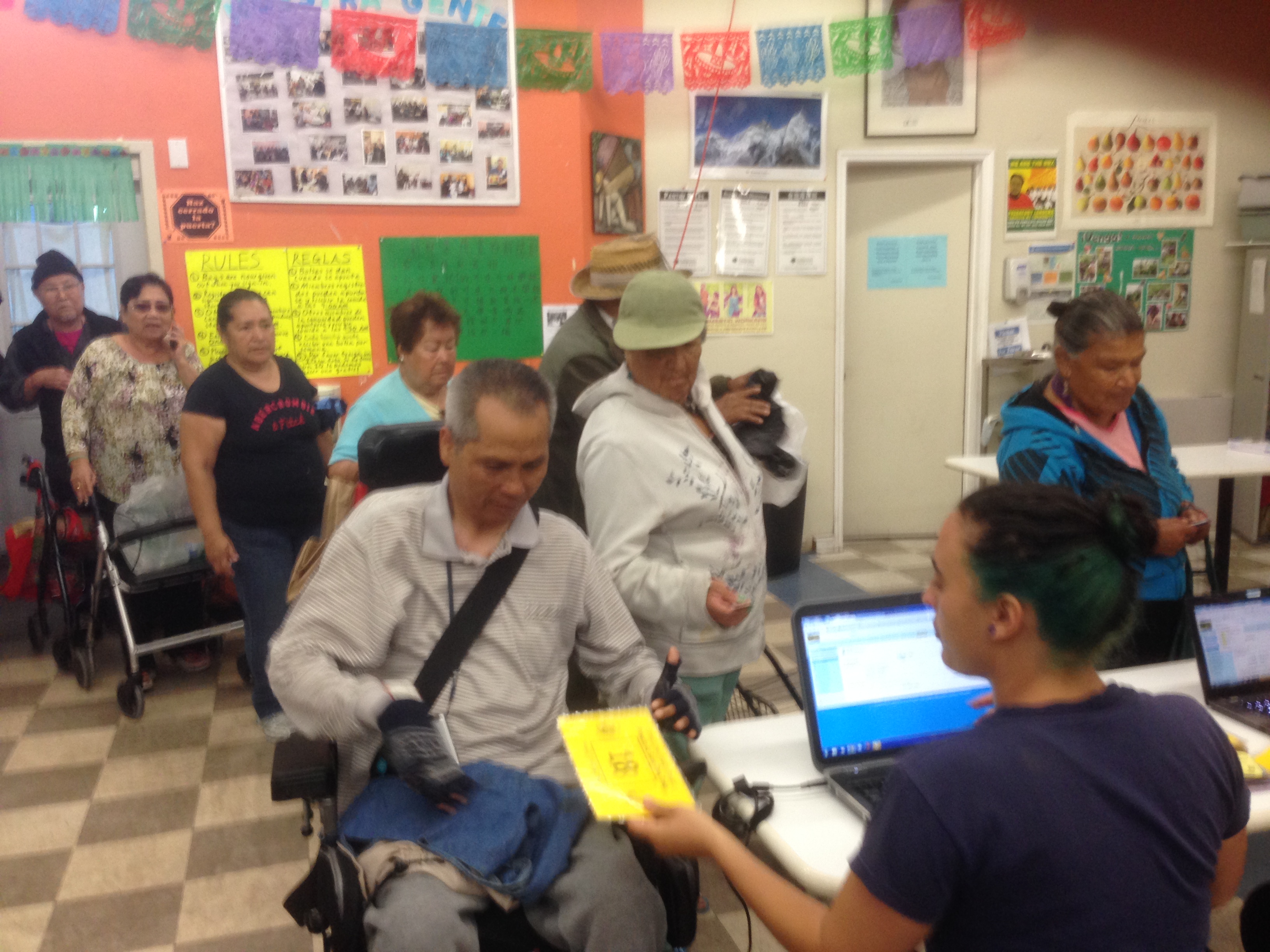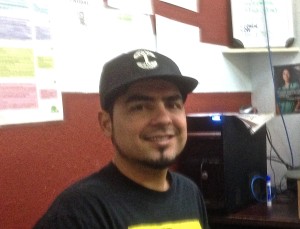
Health clinic volunteer Hermalinda Aguiar leaned forward and said, “We have a saying: ‘Panza llena, corazón contento; Full belly, a happy heart.’” In a phrase, the recent San Francisco State alumna captures the mission of the Street Level Health Project, or Street Level as its known locally. Whether in the neighboring streets or in its small conference room, healthy food is often the entree to Street Level’s full menu of services.
Street Level has expanded rapidly from its humble beginnings in shared office space a dozen years ago. Describing itself as “a safety net of the safety net,” its storefront office at the corner of International and 25th is a doorway to “health care and social service system for those most often overlooked and neglected, namely the uninsured, underinsured and recently arrived,” according to its website ( www.streetlevelhealth.org).
Free basic medical services, medication, and mental health services are provided three days each week by paid staff (10 full and part-time employees) and volunteers (about 30 each week, including college and medical students, doctors, nurse practitioners, and community members). Student interns have returned to volunteer as medical professionals. Service recipients give back by helping with the meals or food distribution.
Interpretation is available in Mam and Mongolian, besides English and Spanish, to over 900 clients representing over 30 different countries of origin. Since health screenings often point to the need for more balanced diets, the staff nutritionist, who is also a trained herbalist, provides weekly workshops and individual consultations. In addition, Street Level helps clients complete the tedious paperwork required by the Affordable Care Act along with basic health programs available to both documented and undocumented residents of Alameda County. More critically, they coach them how to navigate the health care system.
While the clinic remains the heart of the operation, by keeping its pulse on the community, Street Level has evolved into busy community center. Client-driven programs have ranged from classes in chronic back pain, understanding sexual health and diabetes prevention to yoga classes and a women’s knitting group.

“We are informed constantly by what we see and hear in the street,” explained Interim Director Joel Aguiar who is also Hermalinda’s son. “Our direct services — hot meals here, breakfast delivered to workers in the street, twice weekly food distribution of fresh produce, our Oakland Worker’s Collective — happen because we are present on the streets. We value and maintain the close connection with people standing on the corner. We strive to look at all those things that contribute to health and wellness — healthy food, safe jobs, and a sense that we’re all in this together.”
This linkage to the street, which gives the organization its name, was apparent on a recent Monday morning visit.
Long before its doors open at 9 a.m., two staff members have already delivered a van-full of fresh produce from the Alameda County Food Bank. Hermalinda Aguiar joins a crew of five volunteers — women from the surrounding neighborhoods — piling apples, oranges, plums, potatoes, and onions high in boxes along the tables. The same small multi-purpose room will be used to serve a free lunch at 1:30 and, later in the afternoon, for a staff meeting.
Three small offices and a tiny kitchen border on the room where, throughout the day, staff will do everything from directing people to the health clinic down the hall to guiding them to medical appointments and job possibilities. Now, however, they set up at registration table to check in the growing line made up mainly of mothers and elderly Latino and Asian men and women, which is starting to stretch down the block. In minutes, they will fill their bags with the produce of their choice, a welcome healthy supplement to the nutritional needs of their families.

Nearby Estela, who will shortly begin preparing the early afternoon meal, is busy filling some 40 take-out cartons with a hot combination of scrambled eggs, spinach and shredded carrots with a blend of rice and beans. Meantime, outreach worker Francisco Matias — or “Don Francisco” as he is known at Street Level and who arrived at 7 AM to make the food bank pick-up — fills a large cooler with juice and loads the van again. He will deliver this breakfast to the day laborers clustered in groups along street corners up to 20 blocks away.
Don Francisco’s role, however, is more than just bringing morning sustenance. As a Guatemala-born, native speaker of the Mayan dialect, Mam, he is able to connect with the many Mam speakers who comprise much of the current day labor force in E. Oakland. Further, he is able to connect them to the range of services available at Street Level. Most importantly, by keeping his ear close to the ground, Francisco learns about what future services may be required at Street Level.
Years before the mainstream media became aware of the influx of indigenous workers to the area, Street Level noted not just their increased presence but their needs for nutritious food, health care, and work. Driven by increasing civil strife, gang violence, and economic necessity, young Mayans follow the long migrant trail from Guatemalan villages like Todos Santos, Don Francisco’s birthplace, to support their families by working as day laborers and domestic workers.
“People are constantly threatened,” Francisco explains. “There are family members here. They tell them that it’s better here and so they come.”
Next: On the streets with Don Francisco
Bill Joyce is a retired Berkeley teacher and 2016 alumnus of Oakland Voices.

Thank you Bill! You captured the day to day happenings at SLHP! People helping each other… Many needs taken care of with compassion.